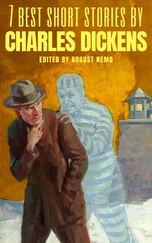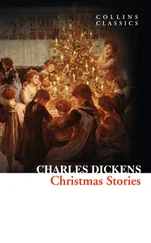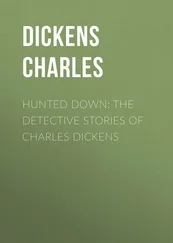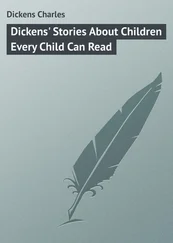Charles Dickens - Short Stories
Здесь есть возможность читать онлайн «Charles Dickens - Short Stories» весь текст электронной книги совершенно бесплатно (целиком полную версию без сокращений). В некоторых случаях можно слушать аудио, скачать через торрент в формате fb2 и присутствует краткое содержание. Жанр: Классическая проза, на английском языке. Описание произведения, (предисловие) а так же отзывы посетителей доступны на портале библиотеки ЛибКат.
- Название:Short Stories
- Автор:
- Жанр:
- Год:неизвестен
- ISBN:нет данных
- Рейтинг книги:4 / 5. Голосов: 1
-
Избранное:Добавить в избранное
- Отзывы:
-
Ваша оценка:
- 80
- 1
- 2
- 3
- 4
- 5
Short Stories: краткое содержание, описание и аннотация
Предлагаем к чтению аннотацию, описание, краткое содержание или предисловие (зависит от того, что написал сам автор книги «Short Stories»). Если вы не нашли необходимую информацию о книге — напишите в комментариях, мы постараемся отыскать её.
Short Stories — читать онлайн бесплатно полную книгу (весь текст) целиком
Ниже представлен текст книги, разбитый по страницам. Система сохранения места последней прочитанной страницы, позволяет с удобством читать онлайн бесплатно книгу «Short Stories», без необходимости каждый раз заново искать на чём Вы остановились. Поставьте закладку, и сможете в любой момент перейти на страницу, на которой закончили чтение.
Интервал:
Закладка:
It was our Vestry – pink of Vestries as it is – that in support of its favourite principle took the celebrated ground of denying the existence of the last pestilence that raged in England, when the pestilence was raging at the Vestry doors. Dogginson said it was plums; Mr. Wigsby (of Chumbledon Square) said it was oysters; Mr. Magg (of Little Winkling Street) said, amid great cheering, it was the newspapers. The noble indignation of our Vestry with that un– English institution the Board of Health, under those circumstances, yields one of the finest passages in its history. It wouldn't hear of rescue. Like Mr. Joseph Miller's Frenchman, it would be drowned and nobody should save it. Transported beyond grammar by its kindled ire, it spoke in unknown tongues, and vented unintelligible bellowings, more like an ancient oracle than the modern oracle it is admitted on all hands to be. Rare exigencies produce rare things; and even our Vestry, new hatched to the woful time, came forth a greater goose than ever.
But this, again, was a special occasion. Our Vestry, at more ordinary periods, demands its meed of praise.
Our Vestry is eminently parliamentary. Playing at Parliament is its favourite game. It is even regarded by some of its members as a chapel of ease to the House of Commons: a Little Go to be passed first. It has its strangers' gallery, and its reported debates (see the Sunday paper before mentioned), and our Vestrymen are in and out of order, and on and off their legs, and above all are transcendently quarrelsome, after the pattern of the real original.
Our Vestry being assembled, Mr. Magg never begs to trouble Mr. Wigsby with a simple inquiry. He knows better than that. Seeing the honourable gentleman, associated in their minds with Chumbledon Square, in his place, he wishes to ask that honourable gentleman what the intentions of himself, and those with whom he acts, may be, on the subject of the paving of the district known as Piggleum Buildings? Mr. Wigsby replies (with his eye on next Sunday's paper) that in reference to the question which has been put to him by the honourable gentleman opposite, he must take leave to say, that if that honourable gentleman had had the courtesy to give him notice of that question, he (Mr. Wigsby) would have consulted with his colleagues in reference to the advisability, in the present state of the discussions on the new paving-rate, of answering that question. But, as the honourable gentleman has NOT had the courtesy to give him notice of that question (great cheering from the Wigsby interest), he must decline to give the honourable gentleman the satisfaction he requires. Mr. Magg, instantly rising to retort, is received with loud cries of 'Spoke!' from the Wigsby interest, and with cheers from the Magg side of the house. Moreover, five gentlemen rise to order, and one of them, in revenge for being taken no notice of, petrifies the assembly by moving that this Vestry do now adjourn; but, is persuaded to withdraw that awful proposal, in consideration of its tremendous consequences if persevered in. Mr. Magg, for the purpose of being heard, then begs to move, that you, sir, do now pass to the order of the day; and takes that opportunity of saying, that if an honourable gentleman whom he has in his eye, and will not demean himself by more particularly naming (oh, oh, and cheers), supposes that he is to be put down by clamour, that honourable gentleman – however supported he may be, through thick and thin, by a Fellow Parishioner, with whom he is well acquainted (cheers and counter-cheers, Mr. Magg being invariably backed by the Rate-Payer) – will find himself mistaken. Upon this, twenty members of our Vestry speak in succession concerning what the two great men have meant, until it appears, after an hour and twenty minutes, that neither of them meant anything. Then our Vestry begins business.
We have said that, after the pattern of the real original, our Vestry in playing at Parliament is transcendently quarrelsome. It enjoys a personal altercation above all things. Perhaps the most redoubtable case of this kind we have ever had – though we have had so many that it is difficult to decide – was that on which the last extreme solemnities passed between Mr. Tiddypot (of Gumption House) and Captain Banger (of Wilderness Walk).
In an adjourned debate on the question whether water could be regarded in the light of a necessary of life; respecting which there were great differences of opinion, and many shades of sentiment; Mr. Tiddypot, in a powerful burst of eloquence against that hypothesis, frequently made use of the expression that such and such a rumour had 'reached his ears.' Captain Banger, following him, and holding that, for purposes of ablution and refreshment, a pint of water per diem was necessary for every adult of the lower classes, and half a pint for every child, cast ridicule upon his address in a sparkling speech, and concluded by saying that instead of those rumours having reached the ears of the honourable gentleman, he rather thought the honourable gentleman's ears must have reached the rumours, in consequence of their well– known length. Mr. Tiddypot immediately rose, looked the honourable and gallant gentleman full in the face, and left the Vestry.
The excitement, at this moment painfully intense, was heightened to an acute degree when Captain Banger rose, and also left the Vestry. After a few moments of profound silence – one of those breathless pauses never to be forgotten – Mr. Chib (of Tucket's Terrace, and the father of the Vestry) rose. He said that words and looks had passed in that assembly, replete with consequences which every feeling mind must deplore. Time pressed. The sword was drawn, and while he spoke the scabbard might be thrown away. He moved that those honourable gentlemen who had left the Vestry be recalled, and required to pledge themselves upon their honour that this affair should go no farther. The motion being by a general union of parties unanimously agreed to (for everybody wanted to have the belligerents there, instead of out of sight: which was no fun at all), Mr. Magg was deputed to recover Captain Banger, and Mr. Chib himself to go in search of Mr. Tiddypot. The Captain was found in a conspicuous position, surveying the passing omnibuses from the top step of the front-door immediately adjoining the beadle's box; Mr. Tiddypot made a desperate attempt at resistance, but was overpowered by Mr. Chib (a remarkably hale old gentleman of eighty– two), and brought back in safety.
Mr. Tiddypot and the Captain being restored to their places, and glaring on each other, were called upon by the chair to abandon all homicidal intentions, and give the Vestry an assurance that they did so. Mr. Tiddypot remained profoundly silent. The Captain likewise remained profoundly silent, saying that he was observed by those around him to fold his arms like Napoleon Buonaparte, and to snort in his breathing – actions but too expressive of gunpowder.
The most intense emotion now prevailed. Several members clustered in remonstrance round the Captain, and several round Mr. Tiddypot; but, both were obdurate. Mr. Chib then presented himself amid tremendous cheering, and said, that not to shrink from the discharge of his painful duty, he must now move that both honourable gentlemen be taken into custody by the beadle, and conveyed to the nearest police-office, there to be held to bail. The union of parties still continuing, the motion was seconded by Mr. Wigsby – on all usual occasions Mr. Chib's opponent – and rapturously carried with only one dissentient voice. This was Dogginson's, who said from his place 'Let 'em fight it out with fistes;' but whose coarse remark was received as it merited.
The beadle now advanced along the floor of the Vestry, and beckoned with his cocked hat to both members. Every breath was suspended. To say that a pin might have been heard to fall, would be feebly to express the all-absorbing interest and silence. Suddenly, enthusiastic cheering broke out from every side of the Vestry. Captain Banger had risen – being, in fact, pulled up by a friend on either side, and poked up by a friend behind.
Читать дальшеИнтервал:
Закладка:
Похожие книги на «Short Stories»
Представляем Вашему вниманию похожие книги на «Short Stories» списком для выбора. Мы отобрали схожую по названию и смыслу литературу в надежде предоставить читателям больше вариантов отыскать новые, интересные, ещё непрочитанные произведения.
Обсуждение, отзывы о книге «Short Stories» и просто собственные мнения читателей. Оставьте ваши комментарии, напишите, что Вы думаете о произведении, его смысле или главных героях. Укажите что конкретно понравилось, а что нет, и почему Вы так считаете.










